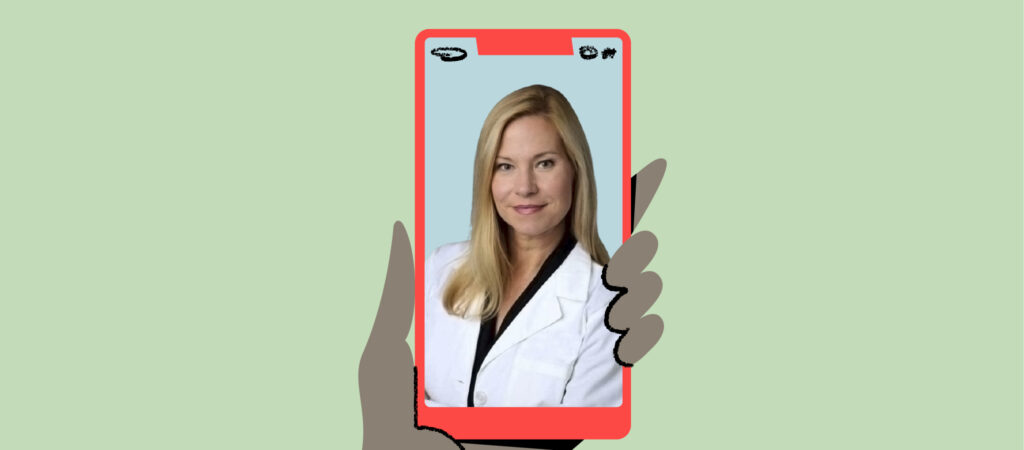Meet Dr. Samantha Brown Parks
This multi-talented medical provider shares the wackiest health myth she had to confront, what she wishes her younger self had known, and more advice for Nurx patients.
The medical providers at Nurx come from diverse backgrounds and live allover the country, but they all share a passion for making healthcare more accessible. That’s definitely true of Samantha Brown-Parks, MD, MPH, a doctor at Nurx who grew up on a farm in Florida with “little to no access to medical care.” That upbringing drove her to become a physician so she could give back to her community and others like it. After earning her medical degree at the University of Miami, she entered the US Army as a general medical officer, then went on to earn a Masters of Public Health and teach at Emory Medical School for more than 10 years. While she loves providing patient care, that’s not Dr. Brown-Parks’s only interesting gig: “My time outside of Nurx is spent helping our family business, Scofflaw Brewing, in Atlanta and appearing an on-air expert medical witness for several syndicated Court related television shows,” she says. She also volunteers for Childspring International’s medical committee, using technology to help diagnose and find surgical treatment for children in the developing world.
“We live in such a fortunate time,” she says. “Through innovative platforms, technology has brought medical care to populations that were once underserved. When I started my public health career in 1997, I never could have imagined the power of the internet or what good we could do remotely. Our reach through remote platforms is truly without limits.”
Learn more about this multi-talented medical provider, including the wackiest health myth she had to help untangle and her advice to her younger self.
What do you wish every patient knew about taking care of themselves?
You are only given one body in life. We need to teach patients how important it is to practice prevention to take care of that body.
What are some health myths or misconceptions you’d like to clear up?
There is a common misconception that one birth control pill has a better side effect profile than others. Each formulation will act differently in each patient. For skin care, there is this thought that once we have tried a treatment and did not receive the anticipated outcome that we cross it off a list and move on. Acne is multifactorial and those factors evolve as our bodies age and change. Just because antibiotics cleared up our acne in our teen years does not necessarily mean that is the answer in our 30’s. We have to look at the whole picture- hygiene, overall health, other medications, hormones- to really have a good grasp on where to start.
About sexual health or health in general? Sex and sexual health are part of our intrinsic make-up as human beings. In our society there is a lot of shame and secrecy around sex which just leads to more misconceptions. A happy, healthy sex life is major component of a happy patient.
What is the wackiest health myth you’ve heard?
I once had to remove a garlic clove many months after insertion to protect against possible yeast infections after sex.
What’s something that patients are often embarrassed about, but shouldn’t be?
Sexual side effects of medications are often left out by patients when describing their past medical history. If there was a problem (or a benefit) we want to know so we can help you get what you need.
What is something important that people can do to take care of their health?
Patients need to use common sense when caring for their bodies. Fad diets and treatments that sound too good to be true, generally are. Eat healthy, clean your skin, brush and floss your teeth. Most importantly, trust actual professionals who are trained to care for patients.
How long does it typically take patients to figure out the skincare treatment plan that works for them?
Some patients can find a successful regimen in just a few months. However, most patients will have to adjust over a year to 18 months to find a good combination that fits their physical, environmental and financial needs. First we start with understanding the type of skin we are dealing with—is it oily, dry, combination? Is the skin particularly sensitive to light, medications, topicals, allergens? Then we look at what was successful in the past and why it may have failed: Did the patient stop treatment? Did hormones change? Was there a geographic change in climate? Lastly, we select a combination that will work with the patient’s routine, lifestyle and long term plan for treatment.
What health advice would you give your younger self if you could?
Start daily skin care as soon as possible, stay physically active, and ALWAYS WEAR SUNSCREEN!! Patients underestimate the destructive power of the sun’s rays. We all need a little vitamin D, but that beautiful ball of gasses in sky can cause a lot of damage to our skin. Always wear your sunscreen.
This blog provides information about telemedicine, health and related subjects. The blog content and any linked materials herein are not intended to be, and should not be construed as a substitute for, medical or healthcare advice, diagnosis or treatment. Any reader or person with a medical concern should consult with an appropriately-licensed physician or other healthcare provider. This blog is provided purely for informational purposes. The views expressed herein are not sponsored by and do not represent the opinions of Nurx™.







